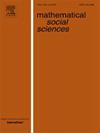Costly expressive voting
IF 0.5
4区 经济学
Q4 ECONOMICS
引用次数: 0
Abstract
We incorporate expressive utility into Börgers’ (2004) canonical symmetric model of costly voting. It is shown that, under reasonable conditions, there exist two types of Bayesian Equilibria, those in which voters vote instrumentally and those in which they vote expressively. We show that equilibria in which voting is expressive is characterized by higher turnout and higher welfare. It is also shown that, in contrast to Borgers, when voting is expressive, turnout is too low.
代价高昂的表达式投票
我们将表达性效用纳入 Börgers(2004 年)的高成本投票典型对称模型中。结果表明,在合理的条件下,存在两类贝叶斯均衡,即选民工具性投票和表达性投票。我们证明,表达式投票的均衡状态具有投票率更高、福利更高的特点。我们还证明,与博尔格斯的情况相反,当投票具有表达性时,投票率太低。
本文章由计算机程序翻译,如有差异,请以英文原文为准。
求助全文
约1分钟内获得全文
求助全文
来源期刊

Mathematical Social Sciences
数学-数学跨学科应用
CiteScore
1.30
自引率
0.00%
发文量
55
审稿时长
59 days
期刊介绍:
The international, interdisciplinary journal Mathematical Social Sciences publishes original research articles, survey papers, short notes and book reviews. The journal emphasizes the unity of mathematical modelling in economics, psychology, political sciences, sociology and other social sciences.
Topics of particular interest include the fundamental aspects of choice, information, and preferences (decision science) and of interaction (game theory and economic theory), the measurement of utility, welfare and inequality, the formal theories of justice and implementation, voting rules, cooperative games, fair division, cost allocation, bargaining, matching, social networks, and evolutionary and other dynamics models.
Papers published by the journal are mathematically rigorous but no bounds, from above or from below, limits their technical level. All mathematical techniques may be used. The articles should be self-contained and readable by social scientists trained in mathematics.
 求助内容:
求助内容: 应助结果提醒方式:
应助结果提醒方式:


